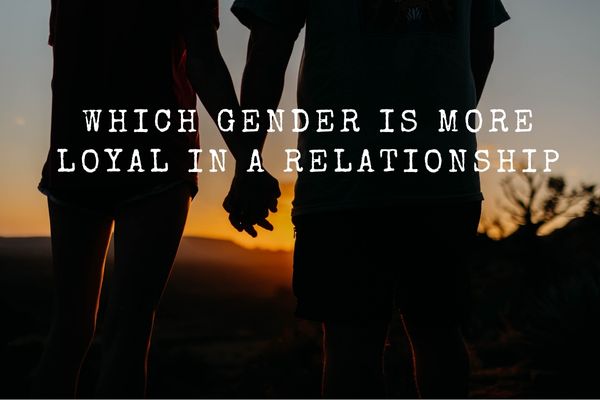There is always a a big question which gender is more loyal in a relationship. Compared to men, women are more reliable. Men commit infidelity for sex; women do so for love.
Compared to men, women are less sexually adventurous. Many of us, whether physicians or Hollywood, stick to this narrative when considering female sexuality.
But the screenplay is predicated on erroneous presumptions about how women view, seek out, and have sex.
Indeed, studies have shown that more than a third of married women who have sex outside their relationships describe those marriages as “happy” or “very Happy” It’s common to think that when women cheat, it’s because they’re unhappy in their marriage, they’ve fallen in love with someone else, or they’re trying to find a way to divorce.
Women may not necessarily prefer sexual one-offs, but they may have fewer opportunities for micro-cheating at lower levels.
“Men have “infidelity gray zones,” tension-releasing activities like lap dances at strip clubs and “happy ending “massages, which make it simple for them to engage in sexual relations outside of
marriage or a committed relationship but which may not be regarded as cheating
Who is more loyal, male or female, in India
One or both spouses admitted to either physical or emotional infidelity in 41% of marriages, according to a 2013 survey by America’s Journal of Marital and Family Therapy. I’m curious about the moral significance of a woman’s falsehood in India, a nation that requires the sanctification of marriages and promotes the idea of ultimate selflessness.
Closer to home, Section 497 of the Indian Penal Code punishes a man alone
for adultery, defined as having consensual sex with a married
woman. This means an Indian woman cannot be punished for adultery and is treated as the victim even if she is involved in an illicit relationship.
Even in such circumstances, the wife cannot be prosecuted for aiding and abetting.

4 Powerful Reasons why Women are more loyal
1. Cheating
I assert that humanity is most likely disloyal in a relationship without emotion. A proverb states, “It’s in a man’s DNA to cheat.” Men typically take the plunge without provocation or even the slightest
justification.
Most guys frequently stop by bars after work to grab a drink with the “boys.” Before returning home to their wives, men typically end up on another woman’s bed from there.
On the other hand, women are inherently extraordinary in romantic situations and have a robust defense against dishonesty. Not that women never cheat, but generally speaking, they are faithful partners due to their genetic makeup.
Men are undoubtedly unfaithful more frequently. They all tend to think of themselves as polygamous. A man might be committed and still have a one-night stand or even sleep
with his ex; however, once a woman is married, she is fully engaged. Most males cannot remain faithful throughout a relationship or marriage and want to keep a “side chick” or get a taste of life outside. When a woman commits her entire heart to one man, all other men become toxic to her.
Contrary to most men who cheat even though they love their wives, women who cheat do it because they don’t love the other person. If you learn that your partner has been having an affair, you could feel as though your entire world has been turned upside down; all of your illusions have been destroyed, and your emotional life has been destroyed.
It is a brutal blow; for many, it means the breakdown of a relationship or marriage. When a person learns of their partner’s infidelity, one of the most challenging questions they pose to themselves is, “Can he cheat and still love me?”In reality, many relationships that are otherwise extremely happy experience affairs. Someone can cheat on their lover without having any emotional deficiency or sexual disorder (although certainly, those factors can sometimes lead to matters). Let’s not forget how strong temptation is. Nobody is immune to it, even in loving relationship.
Being drawn to and desiring to connect with other people on an emotional and sexual level is a characteristic of being a person. Marriage means that you decide not to pursue those feelings for the rest of your life; it doesn’t mean you suddenly cease having them. People who are in committed partnerships don’t suddenly stop finding other people appealing.
Maintaining your partner’s attention requires effort and discipline. The natural response is to experience attraction when temptation appears. We deliberately choose to turn away out of loyalty to our partner.
2. Emotional
Adults’ emotional expressions have been shown to differ somewhat but significantly by gender, with women expressing feelings more openly, mainly when joyful and internalizing negative emotions like grief. In the US and certain Western European countries, several research studies and meta-analyses have revealed tiny but substantial gender
differences in the expression of emotion in adulthood, with women expressing more emotion overall.
Still, men exhibit more degrees of aggression and rage than women. The complexity of emotions includes various elements, including physiological arousal, expressive behaviors, and conscious experience. It is yet unknown if men and women experience emotions differently in other ways, even though the graphic part of emotion has been the subject of extensive research.
Most studies concur that while women are more expressive emotionally, they do not necessarily feel more extraordinary emotions than males. While some researchers have found that women are more likely than males to smile artificially, other studies have found the exact opposite. Because adopting an action that is connected to a specific emotion, like smiling and speaking gently, can produce feeling, this debate is essential. Physical and psychological infidelity in marriage comes in several forms, and men defraud more visibly.
However, cheating goes beyond simply having extramarital affairs; it also includes prioritizing other people over your partner.
You are being disloyal if your boyfriend is working on a project and you are not participating in the planning.
3. More dominant in a relationship?
For those having issues, whether it be a male-male, female-female, or male-female relationship, the communication between partners has become the subject of discussion. Analytically, there are numerous potential causes for relationship issues, dominance is a potent but less obvious part of communication.
More often than not, the male spouse has authority over the relationship. The man is typically thought to be more aggressive, the chaser, than the chased. Men are still expected to dominate far more than women, which may be related to the fact that men are typically bigger than women. In almost all audio-visual mediums, a domineering guy almost always has the upper hand over a subservient woman.
The vast majority of men tend to be influenced by societal expectations of men to exert as much control over relationships as they can. A male will frequently be referred to as “whipped” by his peers; this is a negative phrase that indicates the man is being overruled by his partner. Men try to avoid being in control out of dread of this stigma. A man’s circle of friends frequently views being excessively authoritarian toward his partner (i.e., “I’m the man of the home,” “Do what I say, woman”) as a tremendous asset.
However, women are beginning to take the initiative more frequently and are starting to participate equally in partnership decision-making. Although typically perceived as sexual aggressors, women are increasingly proactive in expressing their needs and want and bringing sexual activity into their relationships. Relationships do not develop in isolation from society.
Although a man may not have as much authority as his girlfriend or wife, he is nonetheless protected by the system of male privilege outside of their relationship. The likelihood of a female spouse abusing or assaulting them is less likely to frighten men. The exception to the trend for males has less authority in a relationship, which is typically a good one.
4. Trustworthy
With possible effects on daily office dynamics, project collaboration, and more significant concerns like compensation and contract negotiations, trust is crucial in professional partnerships.
Prior studies have mainly concentrated on how trust evolves and recovers after a violation and what steps transgressors might take to mend relationships after a trust violation. However, a tiny amount of study has looked into how gender dynamics affect this behavior. Women are more concerned with preserving connections than men are; therefore, after a breach of trust, women are more inclined to mend the relationship rather than lose faith in the offender. Both male and female participants’ confidence significantly decreased after a breach of trust.
In contrast, women are more likely than men to trust their counterparts after a violation, with 22% of women showing this behavior compared to 9% of men. Following multiple betrayals of trust, women are more likely than men to act in a faith-worthy manner toward their counterparts (66% of women versus 48% of men). In their early trust of a business counterpart, men and women do not differ. However, women are significantly more trusting than men in the same scenario after the counterpart violates trust and apologizes.








